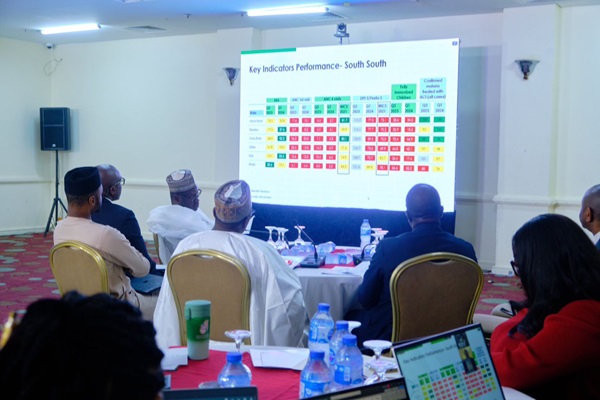
The State-Wide Health Accountability Project (SWAp) said it is spearheading data-driven performance management in Nigeria’s health system to enhance accountability and efficiency.
The national coordinator of SWAp, Dr. Muntaqa Umar-Sadiq presented these findings during the state quarterly performance dialogue on Monday in Abuja, highlighting positive trends in key health indicators.
The inaugural quarterly performance dialogue between the Federal Government, 36 state governments and key health sector stakeholders aims to transform the health system through the Health Sector Renewal Investment Initiative and the Sector-Wide Approach. This initiative emphasises cooperative federalism as mandated by the National Health Act of 2014, fostering shared responsibility and collaboration among all health providers at various government levels, the private sector and development partners.
Umar-Sadiq outlined a strategic plan to boost the health system’s efficiency and effectiveness through rigorous data analysis and state-level engagement. He emphasised the federal government’s role in providing necessary support and resources to states, fostering a culture of accountability and continuous improvement within the Nigerian health system.
“By focusing on accurate data and regular performance reviews, the health sector aims to enhance service delivery and achieve better health outcomes for all Nigerians,” he stated.
He noted the transition from faith-based to evidence-based programme implementation. Despite current data limitations, this shift aims to improve the quality and reliability of health data. Monthly and quarterly dialogues will review progress against key health indicators, facilitating problem-solving and the sharing of best practices across states.
Highlighting the importance of state participation, Umar-Sadiq called for active involvement from state commissioners, noting that collaboration is crucial for addressing regional challenges and leveraging local insights. “Efforts are being made to triangulate data from various sources, including the National Demographic and Health Survey (NDHS), to ensure more accurate and comprehensive information,” he said.
Recent performance assessments reported significant advancements in maternal and child health outcomes across various states in Nigeria. “Across Nigeria, we’re observing improvements in skilled birth attendance, antenatal care visits, and childhood immunisation rates. These indicators reflect ongoing efforts to enhance access to quality healthcare services for mothers and children,” Umar-Sadiq explained.
While celebrating progress in skilled birth attendance, he emphasised the need for continued efforts to ensure comprehensive antenatal care and effective childhood immunisation. “Completing the recommended ANC visits and ensuring full immunisation coverage are crucial steps towards safeguarding maternal and child health,” he added.
He acknowledged regional disparities, noting stronger performances in the south-west and south-south regions compared to challenges identified in the north-central region, particularly in malaria treatment protocols. “Despite these gains, the data underscores the importance of addressing gaps in malaria treatment, particularly in ensuring widespread use of Artemisinin-combination therapy (ACT). Improving malaria treatment protocols remains pivotal to reducing mortality rates among vulnerable populations,” he explained.
Health lead of the Nigeria Governors’ Forum secretariat, Dr. Ahmad Abdulwahab commended the comprehensive overview of national maternal and child health developments, highlighting areas of success and opportunities for improvement across the country. Abdulwahab stressed the need to improve the reporting system by starting data reporting from the facility level rather than the local government level. “This change would reduce transcription errors and improve data quality. By digitising the reporting system at the facility level and providing tablets to these facilities, data can be more accurately recorded and reported directly,” he said.
Meanwhile, Minister of Health, Prof. Muhammad Pate highlighted the critical need for improving data quality and collection tools to assess and enhance the performance of the health system. Pate called on development partners to collaborate with federal, state and local governments to strengthen front-end capacities, ensuring accurate data transcription and evaluative data usage over time. He also stressed the importance of addressing workforce adequacy, supply chains, and service delivery to meet health targets.
Emphasising local government autonomy following a recent Supreme Court judgment, Pate advocated for unified efforts across government levels and partners to optimise resource use and improve health outcomes for Nigerians. The dialogue reaffirms the ministry’s commitment to improving health outcomes for all Nigerians.

